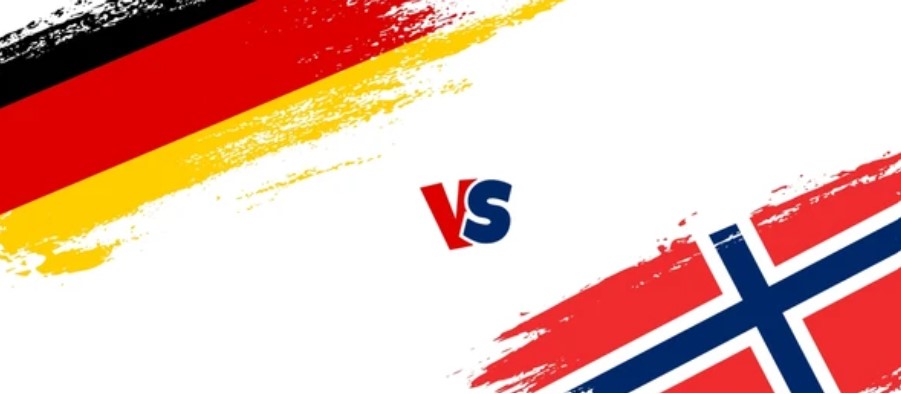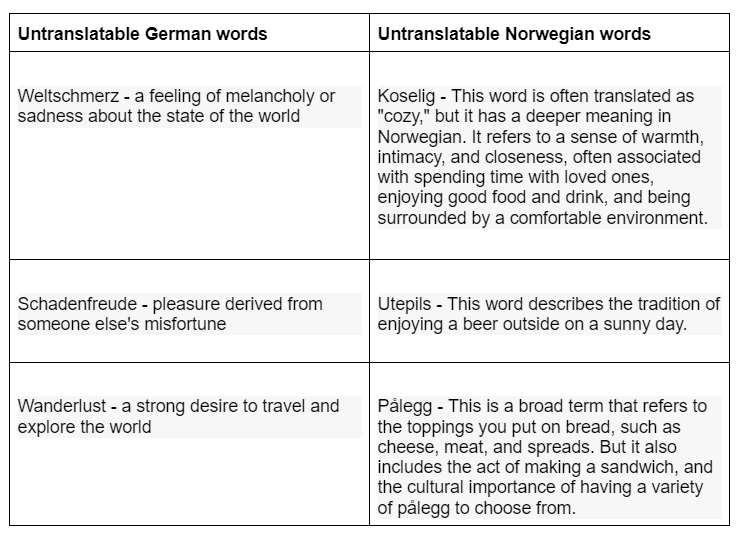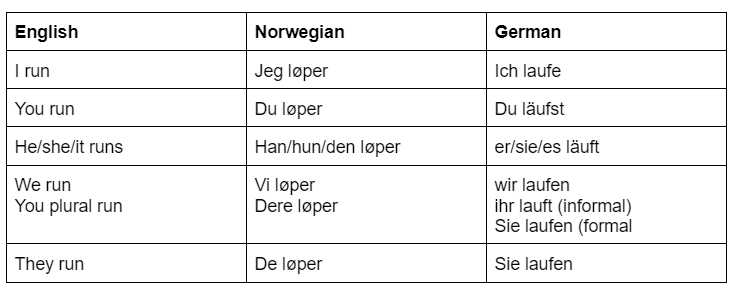
German Vs Norwegian Language
You may think German and Norwegian are similar languages. After all they are both Germanic Languages, wouldn’t that mean they are basically the same? The answer is no, and just how different these languages actually are might surprise you. Let’s take a look!

Key takeaways
- Both are Germanic languages
- They share some common vocabulary
- More differences than similarities
- They are not mutually intelligible
- Norwegian is much easier to learn for English speakers
German Vs Norwegian Language: What Are The Differences?
Norwegian and German are both Germanic languages. As such, they share their roots in the ancient Germanic language spoken thousands of years ago. But after millenia of evolution, the differences between the languages heavily outweigh the similarities.
Vocabulary And Word Formation
Any two languages will naturally have a large difference in terms of their vocabulary. This is also the case between Norwegian and German. Though they share several cognates, as a result of being Germanic languages, most of the vocabulary is different.
The same applies to unique words and expressions that don’t exist in the other language. German, for example, is famous for having a word for everything. Words that are untranslatable to English, or Norwegian for that matter. Norwegian also has words or phrases that are untranslatable into German. Here are some:

Grammar
One area where Norwegian and German differ largely is in their grammar. Down to the core in fact. Norwegian is a S-V-O language. Meaning the subject comes first, followed by the verb, and then the object. This is not always the case, but it’s the general rule. German on the other hand is a S-O-V language. This, elementary keystone grammatical rule, differs between the languages, meaning that the rest will too.
Verb conjugation is also very different. In Norwegian, we conjugate verbs based on the tense only, not the subject pronoun. So if you know how to say a verb in different tenses, you can copy and paste that on to every subject pronoun.
German on the other hand does not operate with this system. Not only are verbs conjugated based on the tense, but also who is performing the action. So it will take more time and effort to get this down.
Noun declensions are also another major point of difference. What are noun declensions you ask? They’re when endings of nouns are changed to reflect a specific grammatical function. This was a common trait in ancient Germanic, and while Norwegian has all but done away with noun declension, they are still used in German.
Pronunciation And Phonetics
Turning our gaze now to pronunciation and phonetics now, we see still more differences.
Norwegian has three extra vowels that do not exist in German. These are Ø, Æ & Å. German, on the other hand, makes use of umlauted vowels, which Norwegian does not.
Norwegian is also very fond of the skj and kj sounds (almost like ch in English, but not quite). Again, these consonant sounds aren’t found in German, which rather uses the pf sound.
In terms of phonetics, Norwegian is a much more sing-songy language than German. That is because intonation and stressing syllables carries with it meaning in the language. So it will sound more melodious than German, which places emphasis on the rhythm of the syllable instead. Because of this, German can sound more monotone and flat than Norwegian.
The Similarities Between Norwegian And German Languages
Even with all the differences between the two, there are still plenty of similarities one can hang one’s hat on though. Let’s take a look at what similarities the two languages share.
Germanic Language Family
Why are they similar? Well, they are both Germanic languages, like English. This means they share a common ancestral language from ages ago. Over the years, the common language evolved into several distinct languages that we see in areas of Europe today.
We can split the Germanic language family into several subgroupings. German belongs to the West Germanic group, along with English, while Norwegian is a part of the North Germanic group.
As a result of being in the same language family, you’ll find some common vocabulary, inflectional endings, the use of strong and weak verbs, and more being used across various languages.

Grammatical Similarities
Though German is a SOV language in generative grammar, it can be seen as an SVO language, like Norwegian in terms of conventional typology. Given this, you will see that some of the simpler sentences in Norwegian and German have the same general word structure.
Both languages also make use of noun gender, which defines how articles, adjectives, endings etc. are conjugates. Norwegian and German have three noun genders, masculine, feminine and neuter. This is something that doesn’t exist in English, and might be a head scratcher for a new learner.
Though verb conjugation is much more complex in German, one similarity can be found in the fact that verbs change their endings depending on what tense/subject pronoun they refer to.
Pronunciation And Phonetic Similarities
There are not many similarities between the two languages, to be honest, but we can still find some.
Both languages are stress timed. That means where you place the stress on a word’s syllables will carry with it meaning. For the most part, stress is placed on the first syllable in a word, but Norwegian is more flexible than German with this rule.
Tired of scrolling through the internet for Norwegian grammar?
Start an organised Norwegian course now.
In order to learn fluent Norwegian, we need to repeat it and speak it several times before our brain learns it.
Learn that in our courses!
Which Language Is Easier: Norwegian Or German?
What makes a language easy or difficult to learn depends on a myriad of factors. What may be easy to you, may not be easy to others.
For an English speaker, learning Norwegian is close to as easy as it gets. The FSI ranks Norwegian as a category 1 language, meaning it will take English speakers roughly 600 hours of study to reach professional level proficiency.
German on the other hand is a category 2 language. This means it will take considerably more time and effort for an English speaker to reach the same heights.
Factors Influencing Language Difficulty
The languages you already speak will have a huge impact on how easy another language is to learn. For German, for example, if you already know languages like Dutch or Afrikaans, learning German will be a sinch.
If, however, English is your only language, then Norwegian will be much easier to learn. This is because the structure of Norwegian is much closer to English than German.
Comparing Grammatical Complexity
German grammar has a reputation for being complex. Take for instance verb conjugation. Not only will you need to know how a verb changes based on the tense, but also based on the subject pronoun. Norwegian is much simpler here. If you know how a verb is conjugated in various tenses, you can use the same version of the verb for every subject pronoun. Take a look at the verb to run for example.

Additionally, German has 6 different verb groups, while Norwegian only has 4. It’s worth noting though, that it’s easier to know which verb group a German verb belongs to based on its ending. Using this you can be sure how to conjugate it if you know the rules.
Norwegian verbs have no such tell as to which group they belong in. So it will be much harder to know how you should conjugate a verb, since you’re not sure if it belongs in group 1, 2, 3 or 4.
Comparing Pronunciation Difficulty
Both languages present some difficulties when it comes to pronunciation. Once again, we’re approaching this as if you’re an English speaker only. Norwegian, though with some challenges, will be again the easier option of the two.
Norwegian has some vowels that do not exist in English, but for the most part what you see is what you get in terms of spelling vs. pronunciation. There are some silent letters here and there, and some consonant combinations that produce unexpected sounds, but for the most part you should get the hang of it.
German, on the other hand, has more vowel sounds that will be unfamiliar to English speakers, and much longer compound words. So, in the beginning stages of learning German, you’ll need to concentrate more inorder to get the pronunciation of specific words down.
Availability Of Learning Resources
Of the two languages, German is by far the biggest. There are plenty more German speakers worldwide (75 million) than there are Norwegian speakers (5,3 million). Naturally, there will be more German resources online.
This doesn’t mean that it will be hard to find Norwegian resources though. It is still a popular language to learn, as it is seen as a gateway language to Scandinavia. A quick google search will lead you to plenty of resources.
If you’re looking to learn Norwegian, why not check out the courses we offer here.

Which Language Should I Learn: German Or Norwegian?
Now that we know that Norwegian is easier to learn than German, but German is more widespread, which language should you choose to learn?
Factors To Consider
Take into consideration your personal interests and motivation first. If you have an interest in either Norway or German, or are motivated to learn more about one of the two countries, it wouldn’t make sense to learn the other language since they’re not mutually intelligible.
The same applies with travel or work. If you’re going on vacation or planning on working in Norway, learn Norwegian. If you’re travelling or starting a new career in Germany, obviously learn German. And if you’re travelling through both, try to learn some basic phrases in each language, but know that Norwegian will be easier.
The Global Influence Of German And Norwegian
No matter how you cut it. German is the bigger of the two languages. It’s seen as a central European language with plenty of huge international companies, more than a handful of world changing historical events, and closer ties to the rest of the world.
Norway is still a player on the international scene, but much less so. We have our precious oil, and hold on to our Viking history with a mix of pride and shame, but it’s safe to say that in comparison, Norwegian doesn’t hold a candle to Germany in terms of global influence.
The Benefits Of Learning Each Language
Learning German will give you access to the whole of Germany. A big country with 83 million people. You’ll also be speaking the language of many huge international companies, which will benefit you if you’re looking for a job.
Norwegian on the other hand, though much smaller, has some benefits too. It’s easy to communicate with Danes and Swedes if you speak Norwegian. So not only will you be able to talk to people in Norway, but the whole of Scandinavia by learning one language.
Reach fluent Norwegian in only 4 months
Find out your level and how to get started now
Did you know that you don’t need all the Norwegian grammar to speak Norwegian? Just a small part of it. In our classes we use just the necessary grammar. Find out what level you are, and what classes you can take to speak fluently.
Can You Understand Norwegian If You Speak German?
Short answer here is no. The languages are very different, and mutual intelligibility is not possible.
The Extent Of Mutual Intelligibility
Though the languages share some cognates, you won’t get much further than understanding a stray word here or there. Making sense of a whole sentence will be difficult if you only speak one of the languages.
Factors Affecting Understanding
The more you understand the other language, the easier it will be to fill in the gaps naturally. So exposing yourself to the other language will definitely help with the understanding.
It can also help knowing other Germanic languages. Though Norwegian and German are not mutually intelligible, they are mutually intelligible with other languages. So if you know some of them, you might be able to pick up the pieces faster.
What Language Is Closest To Norwegian?
We’ve now established that German and Norwegian are pretty far apart. So what langue/s are similar to Norwegian then? Well the Scandinavian ones.
Relationship With Other Scandinavian Languages
The Scandinavian languages belong to the North Germanic language group, and stem from the Old Norse spoken by the vikings. As a result, the languages are pretty close even today after centuries of evolution. In fact, Norwegians like to say that Scandinavia only has one language, but the Swedish don’t know how to spell it, and the Danes don’t know how to pronounce it.

Swedish
Swedish and Norwegian are pretty similar in how they are pronounced. Lots of similar vocabulary and grammatical structure make it easy to understand. But Swedish has more loan words from German and French than Norwegian.
Norwegians like loanwords from English. So some vocabulary might not make it across the border. But still, Norwegians and Swedes can communicate pretty easily together.
Danish
When it comes to writing, Danish and Norwegian are very similar. Denmark ruled over Norway for over 400 years, afterall . So the written language, though with differences, is still very similar today.
The pronunciation is more difficult however. Danes tend to swallow the ends of words and this might make it harder for a Norwegian to understand. Yet, we still consider the two languages to be mutually intelligible, but with some whats and huhs along the way.
Learn fluent Norwegian in 4 months. Start today.
Did you know that you don’t need all the grammar to speak fluent Norwegian? In our classes we focus just on the necessary vocabulary. So you can learn 3 times faster.
Frequently Asked Questions About German And Norwegian Language
Which Language Is Easier: Norwegian Or German?
Norwegian is easier to learn for an English speaker. But other factors might determine which language is easier for you.
Can You Understand Norwegian If You Speak German?
No. The two languages are not mutually intelligible even though they belong to the same language group.
Learn fluent Norwegian in 4 months. Start today.
Did you know that you don’t need all the grammar to speak fluent Norwegian? In our classes we focus just on the necessary vocabulary. So you can learn 3 times faster.
